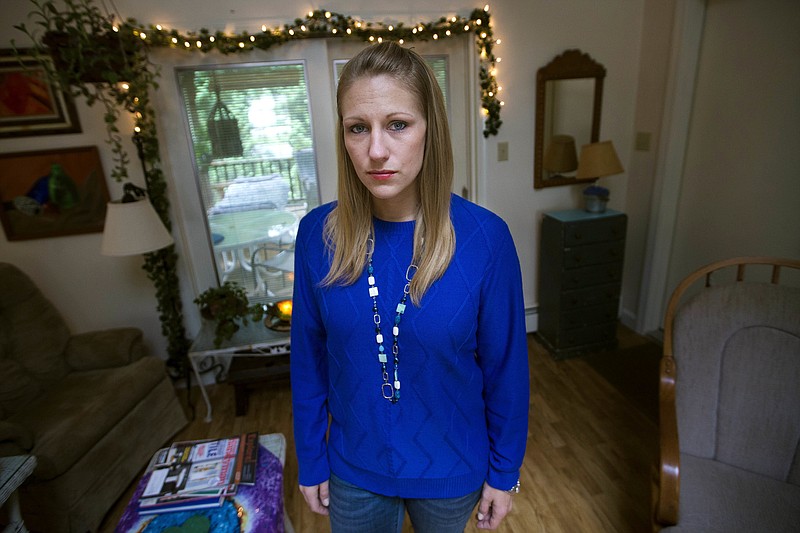BOSTON (AP) - Less than two weeks after a court ordered Julie Eldred to not use drugs while on probation, she tested positive for the powerful opioid fentanyl. The woman, who has severe substance use disorder, spent the next 10 days behind bars in Massachusetts until her lawyer could find a bed for her at a treatment facility.
In a unique case that could have big implications, Eldred is now challenging the practice of requiring people with addiction to remain drug free as a condition of probation. The 29-year-old argues by jailing people with substance use disorder for failing to stay clean, courts are unfairly punishing users for something beyond their control.
"Julie Eldred did not 'choose' to relapse any more than a person who has hypertension chooses to have high blood pressure, a person who is homeless chooses to sleep in an alley, or a person who is destitute chooses not to pay court-ordered fees or restitution," her attorneys write in their brief to Massachusetts' highest court, which is set to hear the case Monday.
Most addiction specialists - including groups such as the National Institute on Drug Abuse and American Society of Addiction Medicine - view substance use disorder as a brain disease that interferes with a person's ability to control their desire to use drugs.
However, the Massachusetts attorney general's office and others fighting Eldred's case argue the probation conditions - which are used widely across the country - help users on their path to recovery. The practice should be upheld because people with addiction maintain the ability to make choices, Attorney General Maura Healey's office argues.
"Research shows that drug-free testing can help probationers reach recovery goals, and testing can help defendants remain engaged in treatment and avoid long-term incarceration," Emily Snyder, a spokeswoman for Healey, said in an email.
Eldred was charged with larceny for stealing jewelry and sentenced to one year of probation, which allows people to avoid jail or prison if they meet certain conditions. She was participating in outpatient treatment when she relapsed and violated no other conditions of her probation when she was sent to jail, where she received no treatment.
Her lawyers said her incarceration was unconstitutional and that her probation violation was not "willful."
Assistant Attorney General Maria Granik said in her brief that Eldred's stint behind bars may have helped save her life, "given the dangerous nature of fentanyl in particular."
The attorney general is being backed in the case by a group of psychologists and psychiatrists who oppose the classification of addiction as a brain disease. Doing away with the probation requirement could have devastating consequences because the threat of jail time encourages users to stay sober, the group argues.
Despite changes in the brain from drug use, people with addiction are not totally powerless to the substances, they say.
"We don't mean people just snap their fingers and give up drugs," said Sally Satel, a resident scholar the Washington-D.C. based American Enterprise Institute and psychiatrist who works at a methadone clinic. "But can they respond to incentives and sanctions? We know they can," she said.
Eldred's supporters said punishing people with addiction doesn't work, and even the threat can cause stress that increases the risk of relapse.
People need to be held accountable for their behavior, said Michael Botticelli, who served as the nation's drug czar under President Barack Obama. The measure, however, should be whether someone is committed to treatment, not whether they relapse - a common occurrence in the recovery process, he said.
"To, in essence, incarcerate someone because they relapsed, without any other criminal behavior, I think is antithetical to the understanding that addiction is a disease," said Botticelli, who's now executive director of the Grayken Center for Addiction Medicine at Boston Medical Center.
Botticelli signed onto an amicus brief supporting Eldred's effort that was filed by the Massachusetts Medical Society, the American Academy of Addiction Psychiatry and several other medical professionals and groups.
A decision in Eldred's favor could transform Massachusetts' criminal justice system, observers say.
"It could be a very earth-shattering type of decision," said Martin Healy, chief legal counsel for the Massachusetts Bar Association. The Supreme Judicial Court is expected to take several weeks or months to issue a ruling.
Now, sober and healthy, Eldred feels like it's important to stand up for others in her shoes, attorney Lisa Newman-Polk said.
"It's a problem that goes on all the time where people are incarcerated or otherwise punished or shamed or ridiculed in court for a relapse," Newman-Polk said. "She knows how devastating and damaging it is."

